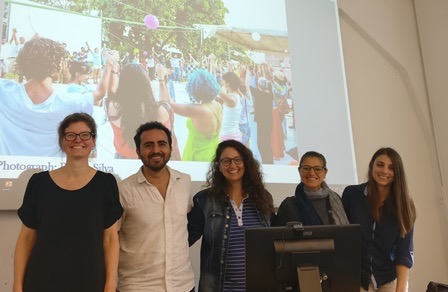Notícias
Departamento de Museologia coordena mesa sobre Sociomuseologia em Rotterdam
02.09.2018

O International Institute of Social Studies (ISS), sediado em Haia, na Erasmus University Rotterdam, realizou entre os dias 27 e 29 de agosto a V Conferência Internacional de Estudos Humanitários. O evento contou com a presença de pesquisadores de diversos países, e teve como foco o debate sobre fronteiras, direitos humanos e situações de crise humanitária.
As pesquisadoras Erica Abreu e Diana Bogado, e o pesquisador Marcelo Murta, do Programa de Pós-Graduação em Museologia, coordenaram um painel intitulado Museologia Social e Função Social dos Museus, onde propuseram um debate sobre os museus no mundo contemporâneo.

O painel contou também com as contribuições de Lisette Mattaar, diretora do Humanity House (Haia), e da pesquisadora grega Inge Zlatkou, atualmente radicada em Dublin.
Lisette Mattaar apresentou a experiência do Humanity House, museu sediado em Haia e com projeto de conscientização sobre o trabalho humanitário e as crises de refugiados. Inge Zlatkou destacou as potencialidades e paralelos entre museus e ONGs para os trabalhos humanitários. A doutoranda Erica Abreu apresentou a experiência de um processo participativo com moradores de Frankfurt que, junto com o cineasta Julian Vogel, realizaram um filme sobre igualdade de gênero atualmente em exposição no Museu Histórico de Frankfurt. A pós-doutoranda Diana Bogado apresentou a luta da Vila Autódromo e do Museu das Remoções pelo direito à cidade. O doutorando Marcelo Murta apresentou o histórico sobre o debate internacional em torno da última Recomendação da UNESCO. O evento contaria, ainda, com a presença de Maurice Mugabowagahunde, com investigação sobre o Instituto Nacional de Museus de Rwanda, que infelizmente não pôde comparecer.
Seguiu-se, após as apresentações, intenso debate, com contribuições de participantes de várias partes do mundo, o que enriqueceu as discussões sobre a função social dos museus. As relações entre museologia e estudos humanitários se mostraram bastante relevantes para o enriquecimento mútuo e futuras possibilidades de colaboração tanto acadêmicas quanto na prática de trabalhos socialmente orientados.
Social Museology and Social Role of Museums by Diana Bogado, Erica Abreu, Judite Primo, Marcelle Pereira, Marcelo Murta, Paula Assunção and Vânia Brayner
Paper: The Social Role of the Museum in Humanitarian Crisis: Learning from NGOs about the effective management of the Syrian Refugee Crisis by Inge Zlatkou
Paper: Evictions and forced removals as instruments to reject the right to the city by Diana Bogado
Paper: The social role of museums in international debate: Recommendation concerning the Protection and Promotion of Museums, their Diversity and their Role in Society (UNESCO, 2015) by Marcelo Murta.
Paper: Come over and use me! A participative film process as an innovation in the museum and instrument for empowerment by Erica Abreu
Paper: Social Museology and Social Role of Museums: case study Humanity House by Lisette Mattaar
Social Museology and Social Role of Museums
Submitted by Diana Bogado, Erica Abreu, Judite Primo, Marcelle Pereira, Marcelo Murta, Paula Assunção and Vânia Brayner
In theme Changing Actors, Views and Challenges from Below
Museums have a primary role in society and, as stated by the latest Unesco Recommendation (2015), provide “a factor in social integration and cohesion”. In this sense, social museology, or sociomuseology, a school of thought developed mainly in Portugal and Latin-American countries, “aims the recognition of museology as a resource, or a tool for sustainable development, based on social and economic inclusion” (Moutinho, 2016). Several experiences come from the “Global South”, and from below, out of traditional and imperial museums, striving for new ways of dealing with social memory for local development.
Based on the premise that “a boundary is not that at which something stops, but that from which something begins” (Martin Heidegger), the museums and memory practices go beyond any established formal borders. They focus human interactions responding to contemporary social demands, reacting to crisis situations but, above all, acting on structural causes of communities’ problems. The local cohesion could be undermined by questions like gentrification processes, urban growth, expansion of agribusiness or weak institutions, based, for example, on violence, intolerance, wars and social inequality. And the solutions could come from local actors from below, having museums and memories as key factors converging poetics and politics.
This panel welcomes papers from experiences based on the social role of museums and memory spaces in bringing answers and solutions to contemporary problems and crisis in local communities. Museums have a primary role in local development and are key actors in topics relating them to migration, human rights, right to memory, local cohesion, re-writing of histories, activism, cultural heritage, response to humanitarian crisis and development.


